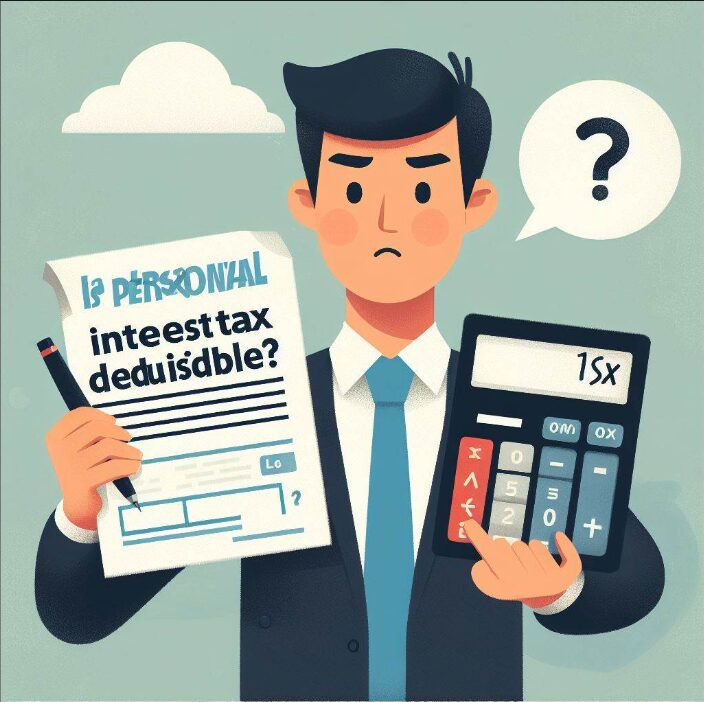Personal loan interest tax is the tax that you may have to pay on the interest that you pay on a personal loan.
Personal loans are a popular way to borrow money for a variety of reasons, such as consolidating debt, paying for home improvements, or covering unexpected expenses. However, one question that many people have is whether the interest on personal loans is tax deductible.
In this article, we’ll explore the answer to that question and more.

What Is a Personal Loan?
A personal loan is a type of loan that you can use for any purpose. You can obtain a personal loan from a bank, credit union, or online lender. Personal loans are typically unsecured, which means that you don’t have to put up collateral to get approved.
Personal loans are usually repaid over a fixed term, such as three to five years. The interest rate on a personal loan is typically higher than the interest rate on a secured loan, such as a mortgage or auto loan, because the lender is taking on more risk.
Personal loan interest tax deduction
In most cases, personal loans do not have tax-deductible interest. This is because you can’t deduct personal expenses from your income taxes.
So if you use the personal loan for vacations, debt consolidation, or living expenses, for example, you can forget the deduction.
However, there are some cases when you can deduct interest on personal loans. If you used the money for one of the following purposes, a tax deduction may be possible.
Keep in mind that personal loan lenders can bar borrowers from using funds for these purposes, and there may be better funding options.
When Is A Personal Loan Interest Tax Deductible?
Here are scenarios when a personal loan interest is tax deductible:
Higher Education Expenses
If you take out a formally structured loan, you can typically deduct the interest that you pay on those loans up to $2,500 per year. This deduction is available to taxpayers who meet certain income requirements and who use the loan proceeds to pay for qualified higher education expenses.
Taxable Investment Expenses
If you use a personal loan to purchase taxable investments, such as stocks, bonds, or mutual funds, you may be able to deduct the interest on your taxes. However, you can only deduct the interest up to the amount of your net investment income.
Business Expenses
If you use a personal loan for business costs, you can typically deduct the interest. This is true even if you are a sole proprietor and use the loan proceeds for personal expenses as well. However, you must be able to show that the loan was used for business purposes.
Frequently Asked Questions
Frequently asked questions about personal loan interest tax deductions:
Can I deduct personal loan interest on my taxes?
In most cases, no. However, there are some exceptions. If you use a personal loan for qualified higher education expenses, taxable investments, or business costs, you may be able to deduct the interest.
Can I deduct personal loan interest on my taxes?
A: In most cases, no. Interest paid on personal loans is not tax-deductible unless you use the loan for qualified educational expenses, taxable investments, or business costs.
What is a personal loan?
A personal loan is a type of unsecured loan that you can use for any purpose. Unlike secured loans, such as mortgages or auto loans, personal loans do not require collateral. Instead, lenders rely on your creditworthiness and ability to repay the loan.
What are qualified educational expenses?
Qualified educational expenses include tuition, fees, books, supplies, and equipment required for enrollment or attendance at an eligible educational institution. Room and board expenses are not considered qualified expenses.
What are taxable investments?
Taxable investments are investments that generate income that is subject to federal income tax. Examples include stocks, bonds, mutual funds, and exchange-traded funds (ETFs).
What are business costs?
Business costs are expenses that are necessary and ordinary for carrying on a trade or business. Examples include rent, utilities, salaries, and supplies. If you use a personal loan for business costs, you can typically deduct the interest.
What is a tax deduction?
A tax deduction is a reduction in your taxable income that can lower the amount of tax you owe. Deductions are subtracted from your adjusted gross income (AGI) to arrive at your taxable income.
What is adjusted gross income?
Adjusted gross income (AGI) is your total income minus certain deductions, such as contributions to a traditional IRA or student loan interest. AGI determines your eligibility for certain tax credits and deductions.
What is a tax credit?
A tax credit is a dollar-for-dollar reduction in the amount of tax you owe. Tax credits are more valuable than deductions because they directly reduce your tax liability.